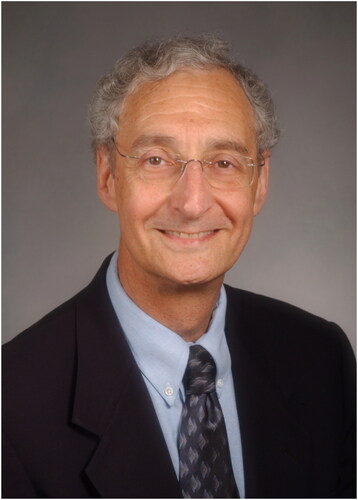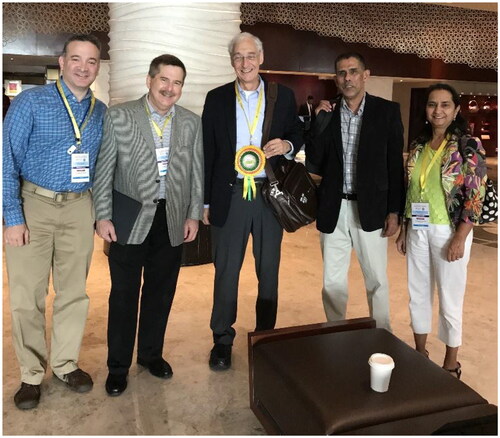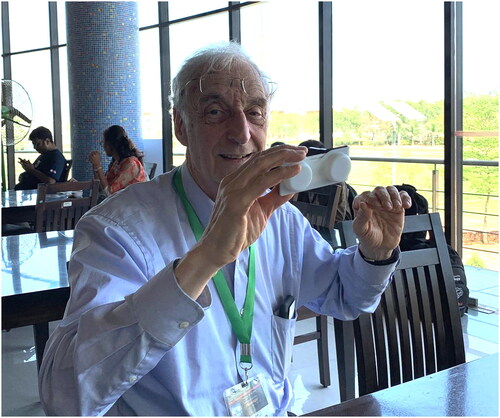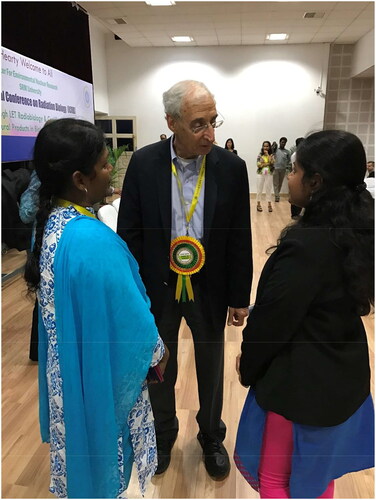Radiation oncology, medicine, and the world lost one of its most kindhearted and gifted leaders and mentors on 1 March 2024, with the passing of Dr. C. Norman Coleman. His life was fully dedicated to service to others and marked by numerous achievements, providing inspirational mentoring, caring, and generosity. His impact on those he touched directly and on all who benefited from his leadership in cancer research and treatment is impossible to calculate. It is a tragic irony that a giant in the field succumbed to advanced cancer. Although much progress has been made in cancer diagnosis and treatment, Dr. Coleman’s loss illustrates that our work is far from being done.
Norm described himself as a kid from Brooklyn, New York, although his family later moved to Teaneck, New Jersey, where he finished high school. He continued his higher education at the University of Vermont where he majored in mathematics, attended medical school at Yale University, and received internal medicine training at the University of California, San Francisco. His first stint at the National Cancer Institute (NCI) was to receive formal training in medical oncology. From there, he returned to California to complete radiation oncology training under the mentorship of Dr. Henry Kaplan at Stanford University. Dr. Coleman was triple board-certified in internal medicine, medical oncology, and radiation oncology. If you asked him, he often called himself a mathematician at heart. Dr. Coleman was interviewed as part of the ASTRO History Interviews Project, which can be found on the American Society of Radiation Oncology (ASTRO) website (Phillips and Sahgal, Citation2016).
Dr. Coleman was recruited by Harvard University’s Joint Center for Radiation Therapy (JCRT)to become the Fuller-American Cancer Society Professor and Chairman at age 39 where he was its Chief Executive Officer for 14 years. While there, he also maintained an active laboratory in addition to his significant clinical and administrative duties. He then returned to NCI to lead the radiation programs and early on created and sustained productive collaborations. He never slowed down, and as world events demanded, he stepped forward post-9/11, assembling a team of experts to explore how to better prepare the nation for radiation-related crises. This led to the establishment of the U.S Department of Health and Human Services infrastructure and planning process for such events, both natural and man-made.
Dr. Coleman’s focus in the lab benefited from his broad experience, training, and influence of his mentors. His laboratory efforts initially looked at novel drug development focusing on multi-agent combinations with radiotherapy. It developed over time to further focus on how radiation can be used to induce new targets allowing treatment optimization. Biologic dose optimization was a team focus, and his recent publications provide a blueprint for the field. He has published over 380 papers and countless talks, book chapters, and reports.
At the time of his death, Dr. Coleman held a number of positions which included Associate Director of the Radiation Research Program (RRP), Special Advisor to the Director of NCI, Senior Investigator in the Radiation Oncology Branch (ROB) in the NCI Center for Cancer Research, and Senior Advisor at the Administration for Strategic Preparedness and Response (ASPR).
Dr. Coleman was co-founder of the International Cancer Expert Corps (ICEC), a nonprofit started in 2013, an official NIH outside activity, and maintained a key leadership role until only a few weeks before his death, continuing to work on projects with experts around the planet including working with CERN.
Dr. Coleman was recognized broadly for his work. Highlights include receiving the 2005 ASTRO Gold Medal (Phillips, Citation2005) (), the Samuel J. Heyman Service to America medal for Homeland Security for his role at Fukushima (Phillips, Citation2011), a 2015 Doctor of Science (honoris causa) for his contributions to public service and society from the University of Vermont, the Radiation Research Society’s 2016 Failla Award (Phillips, Citation2016), the National Coalition for Cancer Survivorship’s 2018 Ellen Lewis Stovall Patient-Centered Cancer Care Award (Phillips, Citation2018), the National Council of Radiation Protection and Measurement’s 2019 Warren Sinclair Medal (Phillips, Citation2019), and the Administration for Strategic Preparedness and Response’s (ASPR) 2023 D.A. Henderson Lifetime Achievement Award (Phillips, Citation2023).
His most cherished roles besides husband, parent, and grandpop, were mentor, clinician scientist, and public servant. His life philosophy was influenced by his interest in East Asian meditative thought, by his mentors, his significant global travel, and a deep desire to learn from others (). He would often credit his global perspective not only to his teachers but particularly to his wife Karolynn, who was always a supportive and loving partner. Together, they published a book on the subject of mindfulness written in a way to be understood by the average person, in particular, a busy scientist. He was immensely proud of his family and what wonderful, brilliant, caring, kind people they are.
Starting early in his career, Dr. Coleman focused on addressing health disparities and equitable access to care, expertise, and treatment. He described his service as a student at Yale and resident in San Francisco in this context when mentoring. At Stanford, Dr. Coleman assisted in developing a community radiation oncology satellite program. At the Harvard Joint Center for Radiation Therapy in Boston, he led a team that initiated an innovative and successful academic-community outreach clinical model for underserved communities in the greater Boston region. As the leader of the NCI’s Radiation Research Program, amongst many other critical programs, he led the implementation of the Cancer Disparities Research Program (CDRP). He was proud of the fact that CDRP has served as and remains a template for such innovative programs to increase underserved population access to clinical trials and ‘state of the art’ cancer diagnosis and care both for the U.S. and beyond, with ICEC in many ways being the most recent example of his lifelong focus.
International partnerships and linkages were important to Dr. Coleman. He would often note that cancer doesn’t understand borders and that the key to achieving global success is in listening and sharing. Not all his activities can be listed in this memoriam, but of note he was active in the All-Ireland Cancer Consortium in 1999, the Singapore National Healthcare Group in 2002, Advisor to the International Network for Cancer Treatment and Research, Institute Pasteur, Brussels, Belgium, and Advisor to the King Hussein Cancer Center (KHCC) in Amman, Jordan. He was a leader in the Global Health Security Initiative within ASPR. His parallel priorities of mentorship and service merged in the formation of ICEC, whose mission combined both to address global inequities in cancer care that has brought people together from around the planet and across areas of expertise.
Dr. Coleman has trained over 400 physicians and researchers in his career, and many of his former trainees have gone on to become thought and service leaders of distinction. Dr. Coleman is universally described by mentees and trainees as a caring listener who helped them find a personalized path to their success in a supportive way. He is widely admired for his humility, kindness, and broad-scale thinking. He treated all patients, colleagues, and strangers, regardless of rank or status, with equal respect and kindness. He fought for justice and fairness and recognized the importance of integrity above all else in science and in human interaction. While he is no longer with us, his work and teachings will endure through his example and influence on us all. Norm was truly a remarkable person. He accomplished so much yet was so humble in his achievements. He was an amazing man who loved to sit and talk science over coffee and a treat, and made time if you needed him. He understood context in ways most did not spend the time and energy to do. He read broadly and was open to the newest thinking and approaches. He tackled some very complex projects and meetings – he knew how to stand back and watch, learn, hear, and listen. He is someone we will always miss and always wish we could just call to share news or a story or to strategize. And then there is how he would create witty and beautiful poems for people at events such as a residents graduation dinner or for retirements. And we don’t even want to start to talk about his triathlons – he even qualified for the world championships this year (again). He was simply amazing. He liked to talk about the Tour de France a lot and all the climbs. Norm inspired and helped us all as we make our own climbs.
Figure 1. Official portrait of Dr. Coleman taken just before the COVID pandemic.
Source: Gabrielle Coleman.

Figure 2. Dr. Coleman (center) and colleagues (l to r: Jeff Buchsbaum (NCI), Marc Mendonca (Indiana University), Pat Prasanna (NCI), and Manjit Dosanjh (currently University of Oxford, UK; then at CERN) teaching a course on High Linear Energy Transfer Radiobiology in Chennai, India in 2016.
Source: Jeffrey Buchsbaum.

Radiation Research Program, National Cancer Institute, Bethesda, MD, USA
[email protected]
Acknowledgement
The authors would like to thank Theodore Phillips, M.D. for his support and sharing of historical data. We would like to thank Eileen Resnick, Ph.D. of the NCI for her editorial suggestions. As a tribute to Dr. Coleman this In Memoriam will be co-published with the International Journal of Radiation Oncology, Biology, and Physics, Radiation Research, and Radiotherapy & Oncology.
Additional information
Funding
Notes on contributors
Jeffrey C. Buchsbaum
Dr. Jeffrey C. Buchsbaum is a Medical Officer in the NCI’s Radiation Research Program and was proud to have been in the large group of mentees of Dr. Coleman. He reported to Dr. Coleman at NCI and was engaged closely with Dr. Coleman on many national and international radiation related projects.
Frank S. Govern
Dr. Frank S. Govern worked with Dr. Coleman at the Harvard Joint Center for Radiation Thaerapy for 14 years and joined him at NCI when Dr. Coleman moved to NCI. He is currently retired from NCI service.
Pataje Prasanna
Dr. Pataje Prasanna is a long time colleague of Dr. Coleman who works alongside Dr. Buchsbaum in the Radiation Research Program. He is a radiobiologist and is a global expert in biodosimetry.
References
- Phillips T, Sahgal A. 2016. C Norman Coleman; Available from: https://www.astro.org/About-ASTRO/History/History-Interviews/C-Norman-Coleman.
- Phillips T. 2005. Available from: https://www.sciencedirect.com/science/article/pii/S0360301605023576?via%3Dihub.
- Phillips T. 2011. Available from: https://servicetoamericamedals.org/honorees/c-norman-coleman/.
- Phillips T. 2016. Available from: https://www.radres.org/page/2016AwardsHonors/2016-RRS-Awards–Honors.htm.
- Phillips T. 2018. Available from: https://youtu.be/L-Kc3HZ8HZQ.
- Phillips T. 2019. Available from: https://www.iceccancer.org/wp-content/uploads/2024/02/Coleman-Warren-Sinclair-Medal.pdf.
- Phillips T. 2023. Available from: https:/www.iceccancer.org/wp-content/uploads/2024/02/TCL50-05.pdf.



